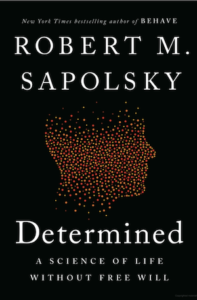Category Archives: Philosophy
Ricky Gervais on Religion
One good habit
habit (noun) – a settled or regular tendency or practice, especially one that is hard to give up
I don’t have a lot of bad habits these days. Don’t smoke or do drugs, drink (beer) in moderation… but when the idea for this post occurred to me, I was thinking of good habits. Things I do with some consistency without having to give them a lot of thought. Consistency being the operative word. If you don’t count brushing my teeth, I really only have one good habit: meditation.
There are almost as many forms of mediation as there are meditators. For me it’s the time I spend each day practicing paying attention. (I’ll skip the long riff on how continuously lost we are in thought we all are.)
 2024 will be the 10th consecutive year of tracking my daily meditation. I think I was practicing for five years or so before I began logging my time on the cushion on November 30, 2014. I ran up a string of 371 days before missing a day (pneumonia). I managed 271 consecutive days before missing again (out of town attending the 50th anniversary of my high school graduation.) I have not missed a day since. 2,101 consecutive days (5.7 years). Total days since I started logging my sessions, 3,317 days.
2024 will be the 10th consecutive year of tracking my daily meditation. I think I was practicing for five years or so before I began logging my time on the cushion on November 30, 2014. I ran up a string of 371 days before missing a day (pneumonia). I managed 271 consecutive days before missing again (out of town attending the 50th anniversary of my high school graduation.) I have not missed a day since. 2,101 consecutive days (5.7 years). Total days since I started logging my sessions, 3,317 days.
I usually sit for 30 minutes. If it’s almost bedtime I might do a 15 minute session and every once in while I set for 45 minutes or an hour. In terms of perceived time, the longer sessions do not seem much longer. But 30 minutes is the sweet spot for me. My one good habit.
Your decisions don’t matter
After 20 years of reading about free will, I have to agree with those who insist it doesn’t exist. It’s an illusion, but probably necessary. Robert Sapolsky has written a book titled “Determined: A Science of Life Without Free Will” this excerpt describes an experience I’m having with increasing frequency.
“You may have had the uncanny experience of talking about an upcoming camping trip with a friend, only to find yourself served with ads for tents on social media later. Your phone didn’t record your conversation, even if that’s what it feels like. It’s just that the collective record of your likes, clicks, searches and shares paints such a detailed picture of your preferences and decision-making patterns that algorithms can predict — often with unsettling accuracy — what you are going to do.”
Sapolsky references a short story by Ted Chiang (What’s Expected of Us) in which the narrator describes a new technology that convinces users their choices are predetermined, a discovery that saps them of their will to live.
“It’s essential that you behave as if your decisions matter,” the narrator warns, “even though you know that they don’t.”
From a review in the Los Angeles Times. (Apple News) Below are some of my favorite bits.
 “Most Americans have negative perceptions of atheists, and antiatheist prejudice is more prevalent than antipathy toward Muslims (which comes in second place), African Americans, LGBQT individuals, Jews, or Mormons.”
“Most Americans have negative perceptions of atheists, and antiatheist prejudice is more prevalent than antipathy toward Muslims (which comes in second place), African Americans, LGBQT individuals, Jews, or Mormons.”
“We are nothing more or less than the cumulative biological and environmental luck, over which we had no control, that has brought us to this moment.”
“While change happens, we do not freely choose to change; instead, we are changed by the world around us.”
“Much has been made of the hospitality, conservatism (as in strictly conserving cultural norms), and violence of the traditional culture of honor of the American South. The pattern of violence tells a ton: murders in the South, which typically has the highest rates in the country, are not about stickups gone wrong in a city; they’re about murdering someone who has seriously tarnished your honor (by conspicuously bad-mouthing you, failing to repay a debt, coming on to your significant other…), particularly if living in a rural area.”
“You can’t successfully believe something different from what you believe.”
“Why did that moment just occur? “Because of what came before it.” They why did that moment just occur? “Because of what came before that,” forever, isn’t absurd and is, instead, how the universe works. […] In order to prove there’s free will, you have to show that some behavior just happened out of thin air in the sense of considering all these biological precursors. […] All that came before, with its varying flavors of uncontrollable luck, is what came to constitute you. This is how you became you.”
“By age three, your average high-socioeconomic status kid has heard about thirty million more words at home than a poor kid.”
“‘Free will’ is what we call the biology that we don’t understand on a predictive level yet, and when we do understand it, it stops being free will. […] We do something, carry out a behavior, and we feel like we’ve chosen, that there is a Me inside separate from all those neurons.”
“We are nothing more or less than the sum of that which we could not control — our biology, our environment, their interactions. […]Try as we might, we can’t will ourselves to have more willpower.”
“We don’t change our minds. Our minds, which are the end products of all the biological moments that came before, are *changed* by circumstances around us.”
“What the science in this book ultimately teaches is that there is no meaning. There’s no answer to “Why?” beyond “This happened because of what came just before, which happened because of what came just before that.” There is nothing but an empty, indifferent universe in which, occasionally, atoms come together temporarily to form things we each call Me.”
“Depression is the pathological loss of the capacity to rationalize away reality.”
A Reason to Stop Worrying
Bertrand Russell: Why I Am Not a Christian (1927)
This post is more about YouTube than Bertrand Russell, or Christianity for that matter. The lecture above was first delivered on March 6, 1927 to the National Secular Society, South London Branch, at Battersea Town Hall.
I’ve heard of Bertrand Russell most of my adult life but don’t think I knew more than he was a philosopher and mathematician. The Wikipedia entry above probably has as much information as I would have gotten in an undergraduate course. And the lecture above (36 minutes) was fascinating.
I’ve been posting videos to YouTube almost since the beginning (February 2005. I uploaded my first video in February of 2006). And, like most people, I’ve spent a fair amount of time watching videos there. More and more, it’s the first place I look for how to do something. And learn something. Yes, there’s no shortage of junk but the more YouTube (and Google) learn about my interests, the more interesting and useful videos fill my stream.
While network and cable news gives us endless talking heads and pundits in 3 to 5 minutes “packages,” YouTube has few constraints. For better or worse, it has become my primary source for news.
How large is the universe?
“We know nothing, so we must be open to anything.”
The Unconscious
“My thesis then, is as follows: in addition to our immediate consciousness, which is of a thoroughly personal nature and which we believe to be the only empirical psyche (even if we tack on the personal unconscious as an appendix), there exists a second psychic system of a collective, universal, and impersonal nature which is identical in all individuals. This collective unconscious does not develop individually but is inherited. It consists of pre-existent forms, the archetypes, which can only become conscious secondarily and which give definite form to certain psychic contents.”
— From a lecture titled The Concept of the Collective Unconscious delivered by Carl Jung on October 19, 1936, to the Abernethian Society at St. Bartholomew’s Hospital in London.
“Nothing You See is Real”
Wikipedia: “Donald David Hoffman is an American cognitive psychologist and popular science author. He is a professor in the Department of Cognitive Sciences at the University of California, Irvine, with joint appointments in the Department of Philosophy, the Department of Logic and Philosophy of Science, and the School of Computer Science. Hoffman studies consciousness, visual perception and evolutionary psychology using mathematical models and psychophysical experiments.”
Based on years of meditation and lots of reading on the subject of consciousness, I actually get this.
Stay Put
“The key to living during this environmental crisis is to STAY PUT. Focus on living and existing in your corner of the Earth, protect it. Travel and moving around all the time is so overrated. A lot of it is a waste of time. Create your own bliss where you are right now. Stop searching the world for it!”
